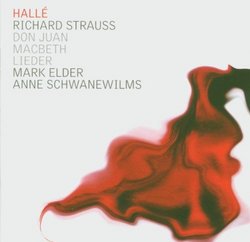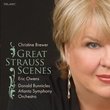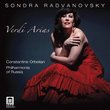| All Artists: R. Strauss, Schwanewilms, Elder, Halle Orch Title: Schwanewilms Sings Don Juan Macbeth Lieder Members Wishing: 0 Total Copies: 0 Label: Asv Living Era Release Date: 5/24/2005 Genres: Pop, Classical Styles: Vocal Pop, Opera & Classical Vocal, Forms & Genres, Theatrical, Incidental & Program Music Number of Discs: 1 SwapaCD Credits: 1 UPC: 743625750829 |
Search - R. Strauss, Schwanewilms, Elder :: Schwanewilms Sings Don Juan Macbeth Lieder
 | R. Strauss, Schwanewilms, Elder Schwanewilms Sings Don Juan Macbeth Lieder Genres: Pop, Classical
|
Larger Image |
CD DetailsSimilar CDs
|
CD ReviewsMark Elder, Halle, Anne Schwanewilms - R Strauss: Alt-View T Dan Fee | Berkeley, CA USA | 01/20/2009 (5 out of 5 stars) "On this disc, Mark Elder as music director lead his home band, the Halle of Manchester. Before coming to the Halle, Elder was music director the English National Opera. My first aural glimpse of his abilities came listening to him as leader of the Bellini and Wagner arias disc, starring Jane Eaglen.... I do not know which grabbed me more, Jane Eaglen, or Elder's conducting. Right off I thought I had better try to keep an eye out for more of his work. Then fairly soon after I ran across him on an even older disc, accompanying Josephine Barstow in her stunning Verdi arias recital disc. (Check that one out, if you want to hear a nomination for best Verdi soprano arias ever - though admittedly you have to give it time to sort of let Barstow's unique vocal qualities grow on you, to the point that you can stop being amazed and hear through all her music.) Then lots more opera, including selected solo arias discs - some with famous singers, some with lesser names - and including complete opera sets. Once Elder arrived in Manchester to step into the latest musical assignment built on a distinguished heritage, lots more orchestra started being published.
Part of what you tend to get in this orchestral work is a brilliant adaptation to the Halle's particular qualities, strengths, and weaknesses. The Halle is the oldest professional band in England after all. Elder continues to encourage his band to capitalize utterly on their old-world European warmth and colorful-awake tonal patina, while keying them up to higher levels so far as virtuoso edge and departmental clarity goes. Elder ever minimizes the fact that the massed Halle tonal weight is never going to carry the pearly solid marble and deep velvet heft of overwhelming bands like Philadelphia, Vienna, and the like. So what? What Elder inspires Halle to do is still marvelous on its own terms. In this Richard Strauss disc, then, maybe we should start off trying to forget comparisons. Hard to do, because right off the bat in the familiar tone poem Don Juan, Elder has to go his alternative Halle-inspired route through the Late Romantic musical woods. The opening flourish of Don Juan is typically played as a cannon-shot, fired-missiles Go. Players are let loose, everybody running muscularly, fine-tuned at more or less top speed right out of the gate. Halle cannot quite manage that free for all, typical race, so what to do? Elder solves the dilemma by taking an acrobatic leap off Start, more like a graceful diver molding gravity's force from a high board than a missile riding atop a ton of exploding fuel. Elder is confident that his players can emphasize the tone poem's deep polyphony instead of laying back to more exclusively depend on a heavy musical moving mass, impressive for tonal size and take-off. I couldn't help but compare this opening to one of my Don Juan fav recordings, with Rudolf Kempe leading (say) Dresden (EMI) or the Royal Philharmonic (Chesky). Not the same, no. The performance quickly settles in, or should I say, my ears soon adapted? So Elder and Halle give us a cogent alternative view of the early tone poem. The lines are always athletic, full of color that is lean and muscular rather than zoftig and saturated. This approach lets everybody bring out the balletic side of Richard Strauss, rather as Mravinsky's Leningrad readings of Tchaikovsky symphonies (DGG Universal) dance, dance, dance, dance. Now admittedly Richard Strauss tone poems are not usually played up all that much for their balletic capabilities. Even the outright composed ballet, based on the story of Joseph and Potiphar's wife in Egypt, usually gets played for its symphonic size and reach. Don Juan is not played slowly, but Elder and the band do take their time, especially in the more relaxed sections. The music gets boldly sensual and languorous in the star seducer's Don Juan exemplars. No lack of musical vitamins there. What is not part of this approach? Well, Elder and the Halle do without the frantic, driven energy that this music typically involves in more traditional readings. This Don Juan is apparently so self-confident that he never really doubts that his passing appeals to women are so charming and so well-timed that all his ladies say, Yes. This Don has no or low anxieties about his seductions. In Elder's hands, Don Juan is infinitely more playful than aggressive or driven. When he gets busy he is never one whit less than artful, graceful. Then this disc passes on to utterly glorious readings of seven of the orchestral songs for soprano voice. Our soloist is completely outstanding, Anne Schwanewilms. All of the songs are taken at fairly slow tempos, and the soprano takes every moment to light up our skies with vocal and textual nuance. Elder and the band are with her all the way. Elder proves he and his players can hold a slow, strong tempo while breathing organically with the singer. Schwanewilms proves that her control is so firmly settled that she can focus on the music, on the song. This would all be way too much if she were not the exceptional Strauss singer that she is. I found myself caught up, entranced, and not tired. Her way with a song text rivals the past greats of recorded lieder recitals, up to and including the revered, legendary Elisabeth Schwarzkopf, or Victoria de los Angeles, or ... pick your fav, Schwanewilms can probably survive the comparison. Macbeth completes the disc. I have always found this early tone poem to be the hardest to appreciate. Yet in keeping with the Don Juan, Elder and the band offer us much to hear and appreciate. They can dramatize without having the youthful gestures go all empty and superficial. Their changes and lights again capture balletic enactments and exchanges. Such a reading will not do for all listeners, especially ones who think ahead of time that a tone poem about Macbeth must be all dark and cold and bloody and dour, as if real Spring never came to real Scotland. Taken on its own terms, I like this reading, so I was little bothered, and very glad not to be flashed and bored by this Macbeth. If you go to Schwanewilms web site, you can also get a link to a video of her singing one of the famous Richard Strauss Four Last Songs. Von Dohnanyi is leading in Lubeck on music video, and it looks like the BBC captured more Richard Strauss on their magazine music disc in Manchester. Just as suspected, the music clips as well as this disc strongly suggest that Schwanewilms could possibly be one of the greatest living Strauss sopranos. One does hear in distant passing that her voice could go wobbly and wear out if she lets the music and theater machines push her faster than she should go. Alas, how often the music industry just uses up and burns out its talented artists, asking them all to achieve global careers by pretending they are all superhuman. Meanwhile. This disc goes to my keeper shelves. And I will be looking about for the BBC Music Magazine disc that offers the Four Last Songs, too. Okay, so Richard Strauss is supposed to be a second-tier composer. But his songs are so high up in the musical heights that I do not think they will ever disappear from the halls, no matter what fate the tone poems suffer. Not so long as the soprano voice is so fitted to this music, knowing hand in velvet pearled glove. With singing like this, long may the Straussian Aurora Borealis shine and spill and dance in our skies." |

 Track Listings (9) - Disc #1
Track Listings (9) - Disc #1
